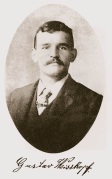“A Dream of Wings”, Smithsonian Press, 1981, p.309
Legally and financially, it would be hard for The Smithsonian to acknowledge Whitehead's claim. By doing so, it would be contractually obliged to forfeit the Wright Flyer exhibit which is largely responsible for the some thirty million visits it receives each year. As its Chief Historian states below, the Wright Flyer is "priceless".
"The subsequent history of the Great Aerodrome [Prof. Langley's aeroplane] and the 1903 Wright Flyer is tortuous. Rebuilt by Glenn Curtiss [The Aerodrome] became the
center of a controversy that lasted over thirty years.
[The rebuilt Aerodrome] did make a number of short hops, on the basis of which the Smithsonian began to advertise the Aerodrome as "the first aircraft in history capable of flight with a pilot
and several hundred pounds of useful load".
Orville Wright, carrying on the patent fight alone after Wilbur's death, was incensed by the Smithsonian's refusal to accept the brother's valid* claim as the first to fly. As a result of the ongoing controversy, Orville refused to offer the 1903 Flyer to the Smithsonian, sending it instead to the Science Museum in London, where it went on display in 1928. Not until 1942 was then Secretary of The Smithsonian C.G.Abott able to convince Orville of a change of heart at the institution. The priceless 1903 Flyer, now universally recognized* as the world's first airplane, was returned to the United States and given a place of honor in The Smithsonian [ ] where is was dedicated on December 17 1948, eleven months after Orville's death."
* Tom goes to great lengths to pamper both his readers and the historical community at large, in many cases kindly making up their minds for them:
The insertion of the judgements,
- "valid" to describe Wilbur Wright's claim to first flight and
- "universally recognized" to describe the Wright Flyer's "first airplane" claim
dispense with the formailities most historians feel bound by and take the reader beyond the bothersome
- presentation of facts and
- editorializing
and actually help the reader to form an opinion.



